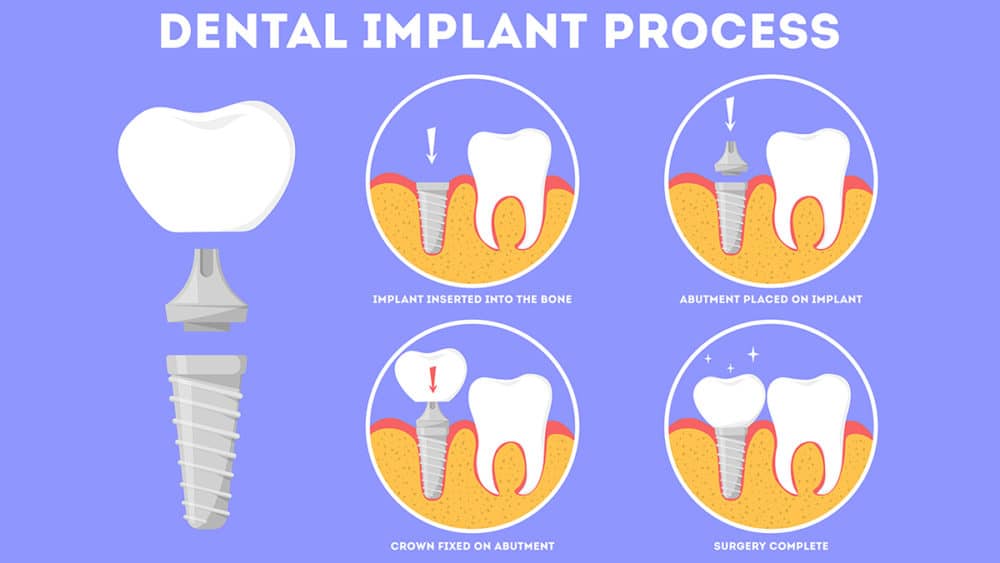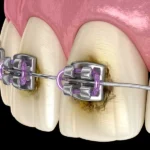How Do Dental Implants Work?

Missing teeth are not something anyone would love. Fortunately, dental implants come in handy for patients who have missing teeth to restore their elegant smiles. Dental implants are essential for replacing missing teeth because of the excellent outcome they bring. In this piece, we have discussed everything you need to know about dental implants, including how does teeth implants work.
Table of Contents
What are Dental Implants?
Generally, dental implants are small posts fixed into someone’s jawbone through surgery. The posts are fixed deep enough into the jawbone to provide adequate support for a crow fixed to replace a missing tooth. The dental implants feel like natural teeth without bringing any discomfort, and they also provide a permanent solution for missing teeth. Additionally, it is an excellent solution for restoring your smile after losing your teeth by accident or a necessary dental procedure.
Types of Dental Implants
There are two main types of dental implants.
- Endosteal. Endosteal is the most commonly used type of implant. It is made from titanium, and it has the shape of a screw. Our periodontists at Omega Dental Specialist place the Endosteal deep into the jawbone to offer firm support for a fixable crown.
- Subperiosteal. It is a type of implant placed under the jawbone. As such, we will place it on the jawbone, or above it. The subperiosteal implant is normally placed in patients that do not have a healthy jawbone due to some underlying medical conditions.
However, if the patient wants to use the endosteal instead of the subperiosteal implant, they can undergo several procedures to rebuild their weak jawbone.
Bone augmentation. Suppose your jawbones are not able to support implants. In that case, you can undergo a bone augmentation procedure to regenerate the jawbone, and give it enough strength to support and enhance your implant. Moreover, you can also use bone additives to facilitate the process and enhance your jawbone strength.
Ridge expansion. Some patient’s jaws may not be wide enough to support the implants. Thus, a ridge expansion procedure may be done to correct the defect. During the procedure, a bone graft is added to a ridge created somewhere on your jaw. [ See: Bone Graft Cost for Dental Implants ]
Sinus lift. It is a procedure that involves elevating the sinus by adding bone to it. Primarily, the procedure is done in situations where the natural bone is affected because of missing teeth.
See Also: How much Dental Implants Cost
Categories of Dental Implants
Dental implants are in three main categories. They are distinguished depending on the number of teeth they replace.
- Single-tooth implants. If you have lost a single tooth, a single-tooth implant will be fixed in your jawbone to replace it. A fixture will be fitted inside the jawbone to support a crown placed to act as an artificial tooth. A single-tooth implant stands on its own, which means that it will not damage the dentition adjacent to it, and it will also enable you to have full functionality of your tooth.
- Multiple-teeth implant. A multiple-teeth implant is fixed in the jaw with a bridge to support it. It is an excellent way of replacing several teeth that are missing. However, for it to work, the missing teeth should be neighboring each other directly. As such, if you have multiple missing teeth, the dental surgeon might fit several rods to replace all the missing teeth efficiently.
- Full-mouth implants. If you have multiple missing teeth, the dental surgeon might decide the best option is to get a full mouth teeth replacement. Hence, if you have any remaining teeth, they are extracted and replaced to give you a lovely smile. A full-mouth implant can be mounted on 2 or 4 implants depending on how your dental surgeon decides. Moreover, full-mouth implants can be permanent or removable, depending on your choice.
See Also: Dental Implants Cost Break Down
Parts of Dental Implants
Dental implants have three main parts, which make it efficient in restoring missing teeth.
The fixture. It is in the form of a small post-fixed in the space where there is a missing tooth. Mounting the fixture is not a complicated procedure because it looks like a screw fused into the jawbone. After a successful fusing surgery, a healing cap is usually added to the fixture to ensure that your gums grow well.
The abutment. The fixture will take approximately two weeks to fuse with the jawbone properly. After they have fused, the surgeon will open up the area again, and they will fix an abutment. An abutment is a small metal that resembles a real tooth, and it is cemented on the fixture.
The crown. It is the part that will be visible in your mouth after the restoration procedure is complete. The crown is matched to the other teeth in your mouth to create a more appealing look. Mostly, the artificial crown resembles a natural crow. Besides, after some time, gums will start growing around it, which gives it a more natural look. However, a crown is only used for a single-tooth restoration.
Materials
Dental implants are of different materials, and it would be best for you to consult your dentist on the best dental material for you.
Titanium. Titanium is a type of metal that is lightweight and durable, making it an excellent material for making dental implants. The implants are also resistant to corrosion, meaning that they can stay in the mouth for a long time, and still work excellently for the patient. Moreover, titanium dental implant has also been in use for a long time, and they have a high success rate of over 93%. However, some patients might have allergies related to titanium. Thus, the dental surgeon needs to do a MELISA test to ensure that the titanium will not cause any problem to the patient.
Zirconia. While the fixture is made of titanium, the crown and the abutment are of zirconia. It is a ceramic dental implant, and it is less durable than the titanium. However, if placed correctly, and cared for in the right way, they will still produce excellent results. The zirconia implants are aesthetic, and created as natural teeth imitations. They come in the same color and size as the natural teeth, which makes them appear more real.
The Pros and Cons of Dental Implants
Pros
Permanent solution for replacing teeth
Ideally, a titanium dental implant gives you back your natural teeth. It is because it offers a permanent solution to your missing teeth, and they even have the potential of lasting your whole lifetime. They are excellent because you will never have to stress because of your missing teeth again once installed in your mouth. If you use dentures instead, you will have to refit and adjust them periodically.
Easy care
Whether you have a single-tooth implant, or a whole-mouth implant, caring for the dental implants is a no-brainer. It is as simple as brushing your natural teeth. With dentures, you will have to remove them every time you want to clean them. In truth, a titanium dental implant is super-easy to care for because you can clean them with regular toothpaste. Thus, you don’t require any adhesive or a denture paste.
Comfortable
Dental implants fit in your jawbones, and they also fit into your mouth so well that you will even forget you have them. They take the posture of natural teeth. Hence, they do not cause any discomfort. But dentures are very uncomfortable even if you continually refit or adjust them.
You can eat anything
Titanium dental implant fits into your jaws adequately, meaning you can bit anything without jeopardizing the state of your implants. You can eat any type of food without worrying about dislodging your implants. But for someone with dentures, they always have to be selective about what they eat because of how shaky and unstable they are.
An elegant smile
‘When you get titanium teeth fitted in your mouth, you will also be able to maintain your elegant smile for many more years. It is because implants are essential in maintaining bone density. They also prevent them from loosening even when you age. The fixed post of the implant transmits the force that helps bones grow and be more robust, just like the other natural roots of other teeth. Moreover, the implant also prevents teeth from shifting their position, which would temper with their alignment.
It boosts your confidence
The crowns that replace missing teeth during an implant are the exact imitation of the natural teeth. Therefore, your smile will be great, and nobody will notice you have a missing tooth. It will give you sufficient confidence that you need.
See Also: Advantages of Dental Implants
Cons
- Long procedure. The procedure of fixing the titanium teeth to your jawbones cannot be done in one sitting. You must visit your dental surgeon several before the procedure is complete. Moreover, you may also wait for a substantial amount of time before the titanium teeth post, and crown fuses with your jawbone.
- Bone density. For you to get a dental implant, you are required to have a specific bone density. Thus, if you don’t have the required bone density, you must undergo bone augmentation procedures. In recent years, bone augmentation procedures have become less painful and less invasive. Some patients may not qualify to undergo the bone augmentation procedures, however.
- Risk of complications. While the surgical procedures of fixing the titanium teeth are deemed safe, the risk of a complication is still not ruled out. You may end up developing a gum infection, or you may get a nerve injury. But the chances of the complications occurring are minimal. Factors like smoking and poor oral hygiene, for instance, may also increase the risks of such complications.
How to Care For Dental Implants
When you get your dental implant fixed in your jaw, you have to ensure that you care for them adequately to avoid complications.
- Brush your teeth. It would be best to brush your teeth at least twice a day. Get a right toothbrush that will reach deep into the titanium teeth, removing any food debris that may be trapped. Be sure to brush your teeth for about 3 minutes to prevent plaque from forming.
- Floss. You should also floss at least one time every day. Generally, flossing helps in removing any food that is stuck between the teeth. However, if you don’t practice care when flossing, you can damage your gums. Thus, it would be best to be extra careful when flossing.
- Avoid smoking. Smoking may damage your jawbone structure, which is an essential element in the dental implant fixing. Smoking will also slow the healing process after you have undergone dental implant surgery.
- Avoid sticky food. Eating sticky foods may temper with the structure of the dental implants, which makes them weaker. While it is not guaranteed that sticky food may be harmful to your titanium teeth, it would be best to avoid them.
- Attend all your dental appointments. You should visit your dentist to assess the condition of your dental implants regularly. Mostly, it is the only way you can be sure that the dental implants are in good condition.
[ See Also: Dental Implants Timeline ]
Frequently Asked Questions
What is the success rate of dental implants?
Generally, how successful your dental implant procedure will depend on you. If you don’t smoke and have good oral hygiene, your procedure’s success rate will be between 93-95%. However, for smokers, and people who don’t have excellent dental hygiene, the success rate may be lower.
How long do dental implants last?
Ideally, the crowns used in a dental implant is artificial. Thus, it is not susceptible to decay like a natural crown. Therefore, the dental implant can last for a very long time. However, how long will the dental implants last depend on how well you take care of them.
How efficient are dental implants?
- Dental implants are more efficient than dentures.
- They are one of the best treatments in 2020 for replacing missing teeth.
- Dental implants offer a permanent solution to missing teeth.
Getting a dental implant to replace your missing teeth is an excellent way of getting rid of the problem. Nevertheless, you have to ensure that you take good care of the dental implants for the best performance.





